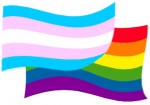Congratulations! You’re the subject of my blog this week! 12,000 page reads a month; that means you’re almost famous! But don’t worry; sorry, what’s your name? (Just so I don’t get it wrong.)
Things you wished you could have said. Or I could have just said ‘hakuna matata’. We were sitting in the interval at The Lion King in London. Yes, sharing a little affection, but not so totally engrossed, if you understand. It was a celebration day out for being together six months and for having moved in completely together at last. A kiss didn’t seem amiss in the circumstances.
‘Excuse me ladies, but can you cut it out?’ came from behind, followed by the usual ‘I’ve got nothing against it personally, I don’t have a problem with it’ (of course not), ‘but there are two nine year old girls here.’
We were both quite taken aback. I’ve had direct abuse and objection both as trans, and as a woman, and I guess I hadn’t expected, after everything I’ve been through, objection to being openly lesbian. Surely times have moved on? What annoyed me most was not being able to have the conversation – like ‘maybe your daughter or her friend will come out as lesbian when they’re older, and need to know it’s normal?’, or: ’But you do have a problem with “it”, don’t you? Why is that?’. I really don’t understand why love and affection between women is immediately perceived by some as some display of kinky sex, or perversion, especially when media, films and the Internet are sexualised in so many less tasteful ways. Who needs protecting from two women kissing, when kissing between different-sex people is everywhere and OK?
God knows what he would have said if I had replied: ‘It’s OK, I used to be a man!’
The show was absolutely brilliant. The lionesses triumphed over evil, and well, it was ‘pride on stage’, wasn’t it! But that little interjection tainted our day a bit, and made us think. We had just watched a street performer in union jack underpants give a suggestive performance constructed around his unique ability to be sandwiched between two beds of nails whilst a beefy man from his audience stood on top of him. What about the children?!
Love between people of the same sex (or gender) is probably encoded before birth, according to familial-trait research published last November, so if anything, we are an education in the way things are, and by being open, others will know that it is natural and OK to love someone of the same sex and/or gender.
This same point was made in a mainstream news article this week by a lesbian teacher – or rather a teacher who is lesbian. She learned that hiding her sexuality was not just an invitation to gossip among colleagues and students, but had led to direct discrimination resulting in loss of a job, when she refused to effectively renounce her sexuality. (She was asked directly to behave ‘less lesbian’, despite being of the very femme variety.) Her realisation, while helping to make a documentary, was to understand that being open was an education and an enabler to colleagues and students alike: it is OK to be LGBT.
Today an article circulated about a town in Baltimore, where the local residents have written to a woman who had a rainbow-coloured display in her garden (yard) saying that it was too gay: ‘this is a Christian area and there are children’. I am still unclear about the children argument: are these people worried about corruption? Or that LGBT natures are contagious? Or that we are perverted, predatory even? This latter ‘fear’ lies behind the US ‘bathroom bills’ and gender-policing of loos. The result last week was a cis woman in the US suing a company for being roughly ejected from a ladies’ loos by a security man (yes, in the ladies’ loos) because she looked too masculine or butch.
No good can come from this objection to LGBT people being open.
Why do we have ‘closets’ at all? Why do LGBT people live in them? If your minority identity is race, you can’t hide it, you have to live with it (and any prejudice) and suffer with it, forcing society ultimately to come to terms with racial diversity. Sexual diversity has found greater acceptance, but unlike race, people can still say ‘be what you like so long as you do it in private’, as if being LGBTQIA… is shameful. It is not! Consequently, trans people top the league in attempted and successful suicide rates. People dare not ‘come out’ for fear of livelihoods, loss of family, social status, even their lives.
Closer to home, I know that I may be acceptable in appearance, but that I am nonetheless noticeably different. I cannot pretend not to have trans history, and therefore there are times (such as ‘meet the parents’) where I need it to be known that I am trans and that it’s OK. Also, I have no intention of avoiding holding hands or kissing as a lesbian woman, just to save upsetting someone else who would not be upset by a hetero couple doing the same.
One morning we were saying goodbye on our ways to work, with a hug and a kiss on the street corner. A young woman came by, murmured her approval, then turned back and smiled and said how sweet we were. Now that’s nice; that’s kind; that’s real.

